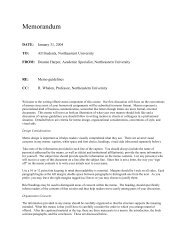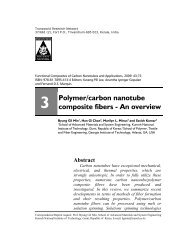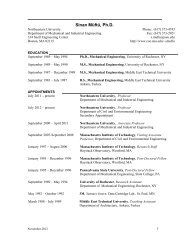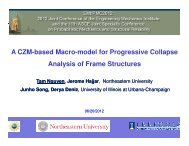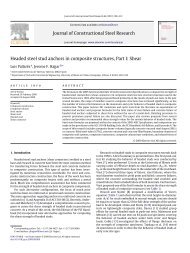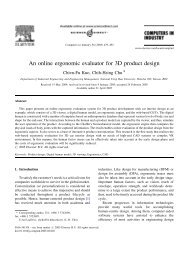yiannis angelo levendis - College of Engineering - Northeastern ...
yiannis angelo levendis - College of Engineering - Northeastern ...
yiannis angelo levendis - College of Engineering - Northeastern ...
You also want an ePaper? Increase the reach of your titles
YUMPU automatically turns print PDFs into web optimized ePapers that Google loves.
vi. Faculty Seminars (SUP) - 40 STEM faculty members at UMass Boston, <strong>Northeastern</strong><br />
University, and Roxbury Community <strong>College</strong> (RCC) have participated in PD to improve their<br />
college teaching.<br />
vii. AP Science Support (SUP) - In Year 5, 308 students (up from 73 in 2006) from 11 schools<br />
participated in our AP Science Support Program, 337 students from 14 schools took AP<br />
science exams, and 234 passed. 46 AP teachers participated in BSP-supported Urban-Focused<br />
AP Institutes.<br />
viii. Highly Qualified Teachers - In the past three years, the number <strong>of</strong> science courses taught by<br />
teachers with the appropriate science license increased by 47%. The number <strong>of</strong> science courses<br />
taught by teachers with no license or a non-relevant license decreased by 22%. The number <strong>of</strong><br />
licensed physics teachers has increased from 7 to 28 in the last 6 years, and 25% <strong>of</strong> all the<br />
teachers <strong>of</strong> science added a STEM license to their credentials.<br />
ix. Sustainability - All 11 CCC courses have been approved at the Universities; two science<br />
education Centers (The Center <strong>of</strong> Science and Mathematics In Context (COSMIC) at UMass<br />
Boston and the Center for STEM Education at <strong>Northeastern</strong>) have been established; BPS has<br />
established staff positions that support CCLS; an M.Ed. in middle school science has been<br />
established at <strong>Northeastern</strong>; and $1.35M in additional related science education grants have<br />
been received by the three core partners to continue aspects <strong>of</strong> the BSP.<br />
x. Dissemination - Over 20 presentations based on BSP work and research have been presented<br />
at national conferences, 2 peer-reviewed journal papers have been submitted, 1 is in<br />
preparation, and 1 book is in press. One <strong>of</strong> them is: “A Vertically-Aligned Contextualized Pre-<br />
<strong>Engineering</strong> Design Course for Middle- and High-School Science Teachers”, by Yiannis. A.<br />
Levendis, Christos Zahopoulos, Cheryl Hall and Jonathan McLaughlin. Proceedings <strong>of</strong> the<br />
ASEE New England Section Meeting, CD-ROM, University <strong>of</strong> Rhode Island, Kingston, April<br />
20-21, 2007.<br />
xi. Cultural Change - The BSP has made tremendous progress at shifting the culture <strong>of</strong><br />
University and District participants. University pr<strong>of</strong>essors have gained respect for K-12<br />
teachers for their skills and pedagogical content knowledge, teachers have benefited working<br />
with content knowledgeable University faculty, and teachers look forward to working together<br />
across grade bands and across disciplines. PD is much more efficient and effective when all<br />
participants "play well in the sand box". The involvement <strong>of</strong> University faculty is critical to<br />
maintaining the accuracy <strong>of</strong> the scientific content, vertically aligning knowledge with<br />
university-level expectations, and maintaining the excitement that the new discoveries <strong>of</strong><br />
science bring to all participants.



